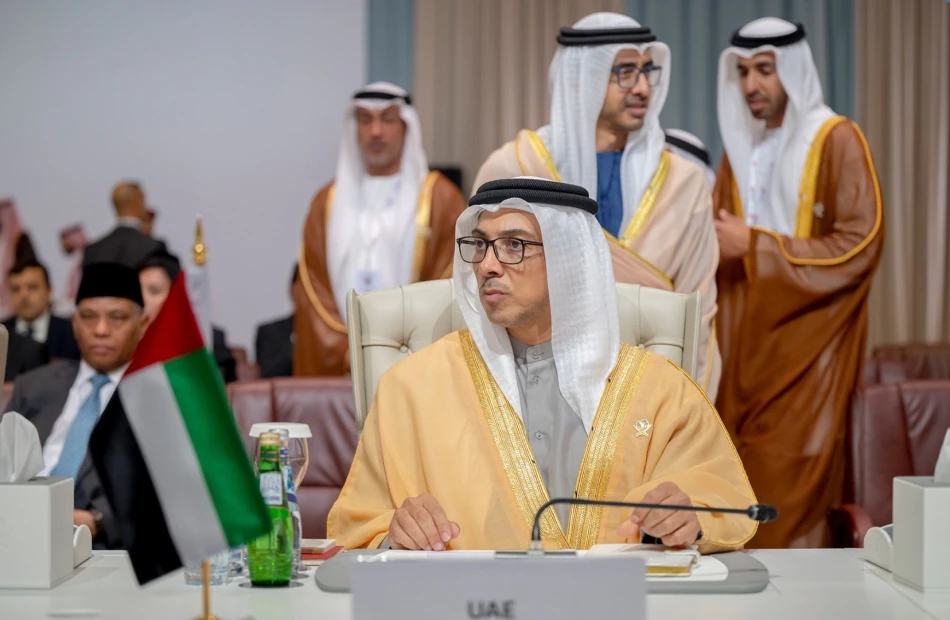
UAE Stands with Qatar, Condemns Israeli Aggression
UAE Leads Gulf Unity Against Israeli Strike on Qatar in Emergency Summit
The United Arab Emirates has taken a prominent diplomatic stance, leading regional condemnation of Israel's September 9 bombing of Doha at an emergency Gulf Cooperation Council and Arab-Islamic summit in Qatar. The high-level gathering signals a potential shift in Gulf diplomatic priorities as regional security concerns override previous normalization efforts with Israel.
High-Stakes Diplomacy in Doha
Sheikh Mansour bin Zayed Al Nahyan, UAE's Deputy President and Deputy Prime Minister, headed the Emirates' delegation to the extraordinary session, representing President Sheikh Mohamed bin Zayed. The summit brought together Gulf, Arab, and Islamic leaders to address what participants characterized as an unprecedented violation of Qatari sovereignty.
The UAE's delegation included Foreign Minister Sheikh Abdullah bin Zayed and several ministers of state, underscoring the gravity Abu Dhabi places on the incident. This represents one of the most senior-level diplomatic responses to Israeli military action in the Gulf region since the Abraham Accords normalized UAE-Israel relations in 2020.
Strategic Implications for Regional Security
Breaking the Normalization Momentum
The UAE's forceful condemnation marks a significant moment in post-Abraham Accords diplomacy. While maintaining economic ties with Israel, the Emirates appears willing to prioritize Gulf solidarity when core security interests are at stake. This calculated approach suggests UAE leadership views regional stability as more critical than advancing normalization in the current climate.
Gulf Unity Over Individual Interests
The UAE's statement that "Gulf Arab states' security is indivisible" reflects a return to traditional Gulf Cooperation Council principles. This unity-first approach mirrors successful Gulf responses to Iranian threats in the 1980s and suggests a maturing regional security framework that can adapt to new challenges while maintaining strategic partnerships.
International Law and Deterrence Strategy
The Emirates emphasized international law centrality and UN Charter respect as pathways to deterring Israel and establishing peace. This legal framework approach aligns with UAE's broader diplomatic strategy of working within established international systems rather than pursuing unilateral actions.
The UAE's call for UN Security Council intervention represents a calculated gamble that international pressure can modify Israeli behavior without requiring Gulf states to abandon their economic interests or strategic partnerships entirely.
Market and Economic Considerations
Despite the diplomatic tension, the UAE's measured response likely aims to preserve its position as a regional business hub while demonstrating solidarity. The Emirates has successfully balanced competing regional pressures before, notably during the Qatar blockade period from 2017-2021, when it maintained economic growth while participating in regional diplomatic initiatives.
Energy markets and regional investment flows will likely monitor whether this diplomatic stance translates into economic measures or remains within traditional diplomatic channels. The UAE's track record suggests preference for compartmentalizing political disputes from economic relationships.
Looking Beyond the Crisis
The summit's emphasis on "stopping escalation and calming situations" indicates Gulf leaders recognize the broader regional implications of allowing such incidents to go unchallenged. With ongoing conflicts in Gaza and Lebanon, Gulf states appear determined to prevent their territories from becoming targets in expanding regional conflicts.
The UAE's leadership in this diplomatic response positions it as a key regional power capable of balancing multiple relationships while defending core security interests. This approach may become a template for managing future regional crises where traditional alliances conflict with immediate security concerns.
Most Viewed News

 Sara Khaled
Sara Khaled






